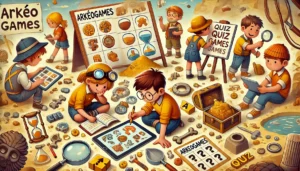How many times have we heard the following comments “Archeology is fascinating, but I think it is more useful to donate money for a healthcare or an NGO working in a developing country”. Of course, this choice seems obvious as archeology is still so much associated with dreams and a pleasant pastime with absolutely no consequences in our daily life. It is time to change this vision and to consent that archeology has got consequences in our daily life for more than two centuries now. Discover how archeology get a strong social impact in our daily lives and how it changes our understanding of the Stranger.
 The social impact of archaeological research is only as strong as how it is used – it can contribute to the healthy development of a society or, on the other hand, it can build up barriers between people and create tensions which can take years and even centuries to overcome.
The social impact of archaeological research is only as strong as how it is used – it can contribute to the healthy development of a society or, on the other hand, it can build up barriers between people and create tensions which can take years and even centuries to overcome.
You seem surprised! After all, what is archaeology? Just a way to understand past societies. Is that really all? If for many archaeologists the use often stops there, it is far from being really the case in our societies where it provides the core material for the history lessons to children from grade school to high school, it supplies tourist guides with invaluable information as they could not do their job without it, it facilitates diplomatic relations with foreign countries thanks to archaeological missions under the authority of the Ministry of Foreign Affairs in France for example, etc. The training of our children, our own individual construction base and many professions depend on the results of archeology.
That said, ask an archaeologist what impact he has on everyone’s daily life or, more brutally, what is he for! Very often, it will be difficult to provide you an answer. This idea of some utility is not yet generalized in university training. However, since the emergence of archeology in the 18th century and the foundations of our European society resting on philosophical thoughts gathered since Antiquity, the archaeologists activity gave birth to many uses. As with any science, we would have done without some of these uses related to fraud and misappropriation of the scientific approach in exchange for results leading to a culture to justify its ascendancy over another: “Our ancestors the Gauls…” during the French colonial period, the Aryan myth in Nazi Germany and many other ideologies nurtured by actors in History (archaeologists, historians, ethnologists, etc.). In a society where only materialist mind is important, get to recognize the importance of the psychology and the value of the intangible remains is fundamental to avoid past mistakes..
Then, what are these famous archaeology uses? This is what ArkéoTopia has listed for you below:
This is what ArkéoTopia has listed for you below:
- ♦ allow everyone to situate themselves in time and space
to help answer the essential question for self-construction: Who am I? - ♦ provide material for History lessons for children, from grade school to high school
whose content bring forth a reflection on the previous “Who Am I?” and move towards The Other whether sitting next to the pupil or beyond his own country. - ♦ ♦ educate young people about scientific and technical culture
This awareness allows them to learn to think for themselves, to develop their critical mind, their ability to argue and thus to be better equipped in the selection of their studies, to vote consciously, to accept and respect The Other as a partner. - ♦ build an inter-generational link where the past is no longer continuously repeated or endured, but rather used
Using archaeology as a lever to find solutions for the future or as a tool allowing young children to find an interest in exchanging with older ones is a fun way to contribute to the awareness of errors to avoid repeating. - ♦ facilitate the foreigners integration in a country, a region or a municipality by providing them with the History of that country, region or municipality thus enabling them to understand them and vice versa by accessing to the History of Others to allow those who receive them to better understand their customs and habits.
- ♦ provide material for tourist guides for their visits, material without which they could not do their job
If this reality is particularly true for prehistoric sites, the same is true for historic sites. The development of archaeological research has shown that while texts do not always provide complete information, their author determines its content. The most striking example concerns the mention delenda in texts from the 18th century. relating to castles whose destruction was only symbolic and not physical as the use of the word suggests. - ♦ participate in the economic life of a place
In addition to tourist guides, the presence of material heritage and therefore an archaeological vestige fuels all the economies revolving around culture. The video of the LeMonde.fr newspaper on The Parable Of The Tuileries. Public funding in culture and arts: A handful of positive economic aspects presents an example that should however has to be treated cautiously, as we pointed out back in 2012. - ♦ limit trafficking antiquities and art works through archaeological expertise
The activity of archaeologists with regards to matters of expertise with UNESCO, Interpol and specialized organizations is important to avoid the destruction of heritage places as much as the theft of art works. This destruction can lead to serious long-term consequences: loss of Memory with dilution of an identity, economic loss linked to tourism, spoliation of family property, etc. - ♦ facilitate diplomatic relations with foreign countries through archaeological missions abroad
- ♦ resolve social difficulties resulting from centennial even millennial resentments, which historical distance allows to overcome
It is thanks to archaeologists that the Israeli-Palestinian conflict could perhaps be resolved in favor of peace. Indeed, willing to work together, Palestinian and Israeli archaeologists have clandestinely gathered so that the past no longer represents a dissension reason, but on the contrary, a gathering. Through the scientific approach of knowledge of the past, archaeological research helps bring people together instead of dividing them. - ♦ influence the new technologies introduction
We have everything to gain by using the experience of ancient civilizations to improve or help the development of populations around the world such as finding the past gestures and techniques thus making it possible to avoid wasting water or natural resources which are becoming scarcer. - ♦ provide a job for youngers who, becoming aware of their rights and their duties towards society, will contribute to the development of a better and more enlightened society.





Archaeological research that produces Knowledge affects the construction of our identity.
To deny it, is to regress. If our societies are currently declining, it has not to be our destiny.
 With archaeological research,
With archaeological research,
let’s improve our knowledge of the past
to better understand our present
and find solutions for our future.
Crédits : ♦ Arpingstone – Wikimedia Commons, Domaine Public ♦ Emdé – Les Bobinettes ♦ Hathier ♦ Jebulon – Wikimedia Commons, Domaine Public ♦ Unesco ♦ Investigation11111 – Wikimedia Commons, CC BY-SA 4.0








